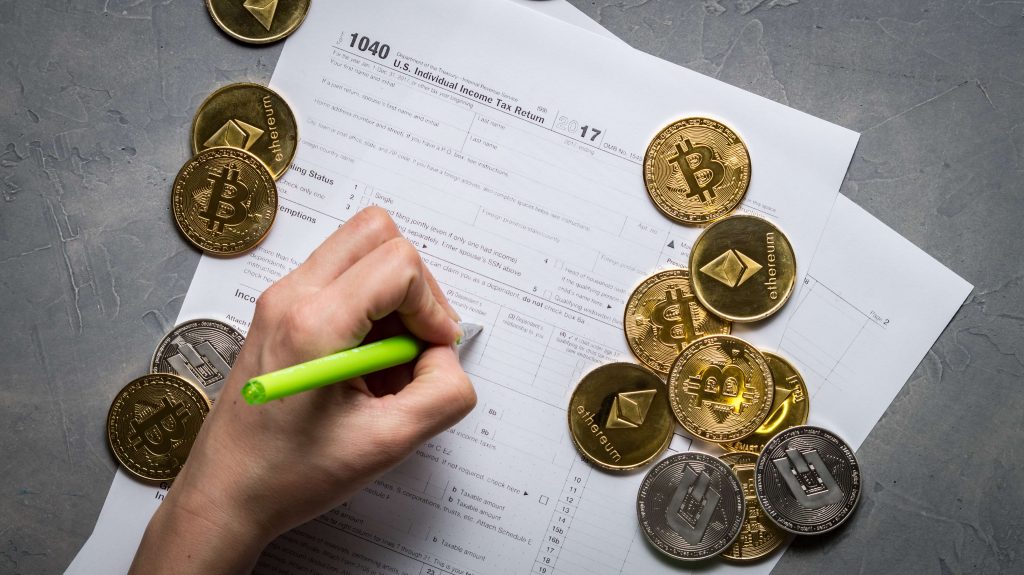The World of Crypto Taxes: The UK Regulations and Rule

One would think that cryptocurrency is a perfect way of gaining profit. This statement is accurate, but people supporting cryptocurrency should bear in mind one meaningful aspect — discharging crypto taxes. As everyone understands, ignorance of the law is no excuse. Not redeeming duties is a severe accusation. It leads to expenses and occasionally even prison.
Check out the article to decide; are you to disburse impositions for owning crypto assets? The report will explain why individuals are to pay crypto tariffs, what topics are exposed to redeeming crypto taxes, and how you can do it.
Is Cryptocurrency Taxed in Great Britain?
Yes, crypto finances are under taxation in the UK. The odd thing about the UK’s lawmaking is that it doesn’t observe cryptocurrency as money or currency — it is regarded as a possession. Numerous countries, including Great Britain, have tariffs on the unique property, so it’s nothing new.
HMRC, or Her Majesty’s Revenue and Customs, is a tax authority in the UK that implements laws and accumulates impositions, crypto capital gains likewise. HMRC is accountable for gathering crypto taxations, and UK citizens are considered to abide by the law and follow the guidelines.
How does HMRC Know the Person Has Crypto Assets?
If the person is not confident whether he belongs to the class of people who are to disburse crypto imposition, some procedures can help comprehend whether the trader is to pay duty:
- The person sells its coins, especially if he purchased it for a cheaper price and then traded it at a higher price.
- The user exchanges his personal crypto belongings for another type of cryptocurrency — for instance, USDT to SOL.
- The trader uses his coins to discharge to get services or goods.
- Suppose the person makes a present in the form of coins to another individual. The sole exception is when he delivers his assets to a spouse or a civil partner.
- The user grants crypto assets to charity, and the Capital Gains Tax legislation can handle the transaction. The exception here is when the investment cost isn’t more elevated than the contribution completed to goodwill; if the user bought crypto tokens at a lower price and gave them to charity, he disburses the Capital Gains Tax when acquiring the token increases.
To sum up, if you gain cryptocurrency from keeping, trading, gifting, etc., you must stump up taxations. If the person is a miner or trader, he pays special duties. One is taxed if he swaps assets for fiat or crypto funds. Any profit earned thanks to trading or purchasing coins is a taxing venture. Nevertheless, there is an exception. If the earnings do not surpass £12,300, the person doesn’t have to discharge tariffs.
Nonetheless, there is a method not to disburse crypto imposition. Maintaining your crypto savings is lawful and won’t get you into a problem. But as soon as you trade tokens, you get taxed. Relying on the earnings, the person pays from 0% to 45%, unless the gain is more downward than £12,300. Additional points on how you get taxations are defined in the following sections of the article.
Generally, HMRC is still looking forward to finding crypto traders who gained profit during the crypto boom period. This period has lasted from 2017 to 2019, when many crypto traders have successfully invested in crypto but didn’t disburse any taxations. HMRC is still investigating these cases.
The punishment for not disclosing gains during this period is rather severe. Traders might get a 20% capital gains tax, be penalized up to 200% of any tax due. In some cases, traders might even face criminal charges and end up in jail. According to current UK rules, it can still be avoided if traders disclose their profits and pay crypto taxes.

Why Do the Government Tax Your Crypto Funds?
As you know, the very first cryptocurrency, Bitcoin, was introduced back in 2008. The price of purchasing Bitcoin was meager back then. It wasn’t beneficial and was sold for about a penny or so. But years later, the cost of Bitcoin skyrocketed, especially during 2017 and the beginning of 2021.
Now imagine the profit earned by people who sponsored Bitcoin in 2008 or before 2017. The earnings of these people are massive. It is only natural to pay taxations when you have such gains. Moreover, Bitcoin is not the only coin inflated costs during the crypto boom period.
The most straightforward explanation of why people have to stump up crypto tariffs in the UK is because of the legislation. It states that all proceeds that overreach £12,300 must be taxed. If you don’t surpass £12,300, you don’t disburse tariffs. But the more yield you accumulate from different economic procedures with crypto, the more taxes you bear.
How Much Crypto Taxes Do You Pay in Great Britain?
What quantity of imposition is the person assumed to pay if he accumulates from maintaining or swapping coins? The answer relies solely on the amount of profit he brings from crypto. If you don’t surpass the yield of £12,300, you can regard yourself as a tax-free digital coin. If you don’t transcend this totality, you don’t repay anything.
But for any English and Welsh taxpayers (excluding Scottish citizens, they have different tax laws), the tax rate of 10% of their annual profit doesn’t exceed £37,500. If a person calculates their annual gain from having operations with crypto exceeds £37,500, they disburse 20% CGT.
How to Estimate the Capital Gains Tax (CGT)?
The capital income in crypto indicates identical earnings in any other asset or share. It shows how much you spend on acquiring crypto and how much you accumulate. You get capital gain when you trade coins, and this procedure brings you more cash than you paid to buy these crypto tokens.
The quantity of money you spend on acquiring crypto-assets is the price foundation. It doesn’t exclusively contain the cost of an asset at the purchase but transfers fees or any other corresponding fees you had to redeem to accept coins. To comprehend how much capital gains you received, you must understand the cost basis. It is vital to maintain journals of your trades to estimate your capital gains on crypto if it overextends £12,300.
The capital gain contrasts the purchasing cost of crypto (with fees) and the selling cost.
How can I Discharge Taxes on Crypto Coins?
Firstly, it is vital to determine whether your capital gain overextends £12,300 within the 12 months. You have to keep journals of your investments and sales during the year.
For instance, you purchased Solana for 1 pound per 1 SOL, and you bought 100 SOL at this cost. Then it advanced and reached £148.41. You have 100 SOL tokens that now cost £14.841. If you don’t trade the coins, you don’t have to discharge capital gains tax.
But if you opt for selling your 100 SOL, you are to pay capital gain tax since it transcends £12,300. The tax, in this case, is 10%. First of all, estimate the capital gain.
You have spent £100 to achieve 100 SOL tokens, but you also paid money to pay expenses on acquiring 100 SOL on your reserve, let’s say around £10. So, the price basis is £110. The capital gain from selling your SOL, in this case, is £14.841-£110 and minus any fee you had to pay on selling coins. In this case, it’s £14.731, so you need to discharge £1473.1 CGT.
